英语六级听力真题模拟练习
- 格式:docx
- 大小:37.79 KB
- 文档页数:3
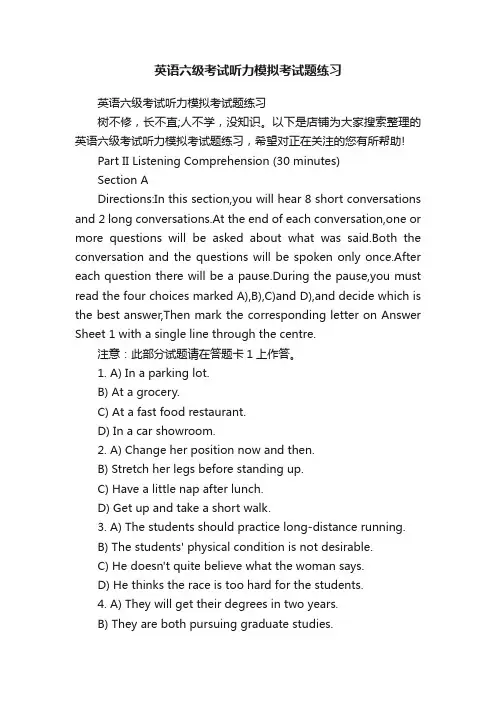
英语六级考试听力模拟考试题练习英语六级考试听力模拟考试题练习树不修,长不直;人不学,没知识。
以下是店铺为大家搜索整理的英语六级考试听力模拟考试题练习,希望对正在关注的您有所帮助!Part II Listening Comprehension (30 minutes)Section ADirections:In this section,you will hear 8 short conversations and 2 long conversations.At the end of each conversation,one or more questions will be asked about what was said.Both the conversation and the questions will be spoken only once.After each question there will be a pause.During the pause,you must read the four choices marked A),B),C)and D),and decide which is the best answer,Then mark the corresponding letter on Answer Sheet 1 with a single line through the centre.注意:此部分试题请在答题卡1上作答。
1. A) In a parking lot.B) At a grocery.C) At a fast food restaurant.D) In a car showroom.2. A) Change her position now and then.B) Stretch her legs before standing up.C) Have a little nap after lunch.D) Get up and take a short walk.3. A) The students should practice long-distance running.B) The students' physical condition is not desirable.C) He doesn't quite believe what the woman says.D) He thinks the race is too hard for the students.4. A) They will get their degrees in two years.B) They are both pursuing graduate studies.C) They cannot afford to get married right now.D) They do not want to have a baby at present.5. A) He must have been mistaken for Jack.B) Twins usually have a lot in common.C) Jack is certainly not as healthy as he is.D) He has not seen Jack for quite a few days.6. A) The woman will attend the opening of the museum.B) The woman is asking the way at the crossroads.C) The man knows where the museum is located.D) The man will take the woman to the museum.7. A) They cannot ask the guy to leave.B) The guy has been coming in for years.C) The guy must be feeling extremely lonely.D) They should not look down upon the guy.8. A) Collect timepieces.B) Become time-conscious.C) Learn to mend clocks.D) Keep track of his daily activities.Questions 9 to 11 are based on the conversation you have just heard.9. A) It is eating into its banks.B) It winds its way to the sea.C) It is wide and deep.D) It is quickly rising.10. A) Try to speed up the operation by any means.B) Take the equipment apart before being ferried.C) Reduce the transport cost as much as possible.D) Get the trucks over to the other side of the river.11. A) Find as many boats as possible.B) Cut trees and build rowing boats.C) Halt the operation until further orders.D) Ask the commander to send a helicopter.Questions 12 to 15 are based on the conversation you have just heard.12. A) Talk about his climbing experiences.B) Help him join an Indian expedition.C) Give up mountain climbing altogether.D) Save money to buy climbing equipment.13. A) He was the first to conquer Mt. Qomolangma.B) He had an unusual religious background.C) He climbed mountains to earn a living.D) He was very strict with his children.14. A) They are to be conquered.B) They are to be protected.C) They are sacred places.D) They are like humans.15. A) It was his father's training that pulled him through.B) It was a milestone in his mountain climbing career.C) It helped him understand the Sherpa view of mountains.Section BDirections: In this section, you will hear 3 short passages. At the end of each passage, you will hear some questions. Both the passage and the questions will be spoken only once. After you hear a question, you must choose the best answer from the four choices marked A), B), C) and D). Then mark the corresponding letter on Answer Sheet 1 with a single line through the centre.注意:此部分试题请在答题卡1上作答。
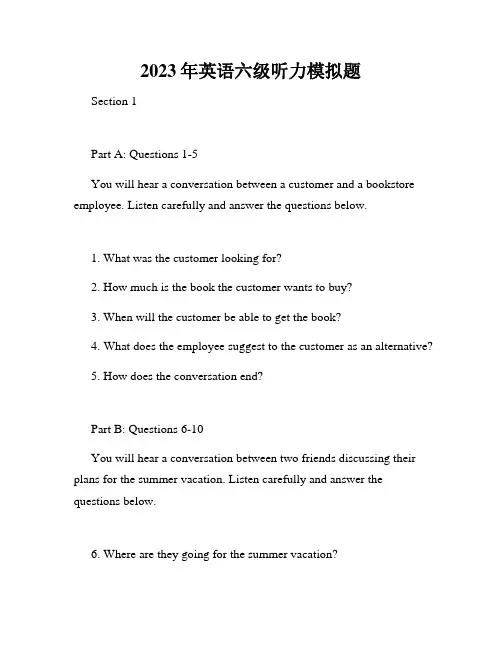
2023年英语六级听力模拟题Section 1Part A: Questions 1-5You will hear a conversation between a customer and a bookstore employee. Listen carefully and answer the questions below.1. What was the customer looking for?2. How much is the book the customer wants to buy?3. When will the customer be able to get the book?4. What does the employee suggest to the customer as an alternative?5. How does the conversation end?Part B: Questions 6-10You will hear a conversation between two friends discussing their plans for the summer vacation. Listen carefully and answer the questions below.6. Where are they going for the summer vacation?7. How long will they stay there?8. What activities do they plan to do?9. How will they get to their destination?10. What will they do before leaving?Section 2Part A: Questions 11-15You will hear a news report about a new technology for the home. Listen carefully and answer the questions below.11. What is the new technology called?12. What can it do?13. How does it work?14. What are the advantages of using this technology?15. What is the potential downside mentioned in the report?Part B: Questions 16-20You will hear a lecture in a history class about a famous historical figure. Listen carefully and answer the questions below.16. Who is the historical figure being discussed?17. When did he live?18. What is he known for?19. What are some of his major achievements?20. How did he impact society during his lifetime?Section 3Part A: Questions 21-25You will hear a conversation between two students discussing a group project. Listen carefully and answer the questions below.21. What is the topic of their group project?22. How many people are in their group?23. What is the deadline for the project?24. What roles will each person take in the project?25. How do they plan to divide the workload?Part B: Questions 26-30You will hear a lecture in a biology class about genetics. Listen carefully and answer the questions below.26. What is genetics?27. What are genes made of?28. How do genes determine our characteristics?29. What is DNA?30. How do genetic mutations occur?Section 4Part A: Questions 31-35You will hear a conversation between two friends discussing their plans for the weekend. Listen carefully and answer the questions below.31. What do they plan to do on Saturday?32. Why can't they go to the movies on Sunday?33. Where will they meet on Saturday?34. How will they get to their destination?35. What time will they meet on Saturday?Part B: Questions 36-40You will hear a lecture in an economics class about supply and demand. Listen carefully and answer the questions below.36. What is supply and demand?37. How do prices affect supply and demand?38. What happens when supply exceeds demand?39. What happens when demand exceeds supply?40. How do supply and demand influence the economy?以上就是2023年英语六级听力模拟题的内容。
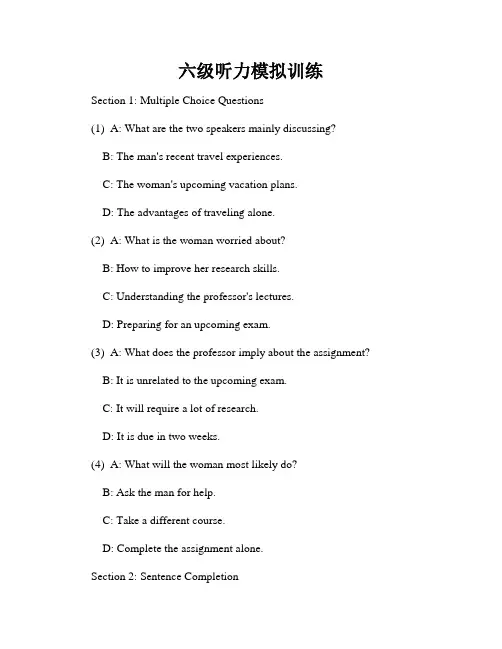
六级听力模拟训练Section 1: Multiple Choice Questions(1) A: What are the two speakers mainly discussing?B: The man's recent travel experiences.C: The woman's upcoming vacation plans.D: The advantages of traveling alone.(2) A: What is the woman worried about?B: How to improve her research skills.C: Understanding the professor's lectures.D: Preparing for an upcoming exam.(3) A: What does the professor imply about the assignment? B: It is unrelated to the upcoming exam.C: It will require a lot of research.D: It is due in two weeks.(4) A: What will the woman most likely do?B: Ask the man for help.C: Take a different course.D: Complete the assignment alone.Section 2: Sentence Completion(1) The university cafeteria will be closed for _________.A: renovationsB: a staff meetingC: a holiday celebrationD: maintenance work(2) The professor emphasized the importance of _________ in academic writing.A: avoiding plagiarismB: using complex vocabularyC: adding personal opinionsD: following a specific format(3) The student asked the professor for an __________ on the assignment.A: extensionB: explanationC: exampleD: evaluation(4) The train to London has been _________ due to a mechanical issue.A: delayedB: canceledC: reroutedD: rescheduledSection 3: Short Conversations(1) A: When is the deadline for the research paper?B: Next Wednesday.(2) A: What is the woman planning to do this weekend? B: Go hiking in the mountains.(3) A: Did you enjoy the film?B: Yes, I thought it was very entertaining.(4) A: Where did you get your laptop repaired?B: I took it to a store downtown.Section 4: Long Conversation(1) A: What are the two speakers discussing?B: The benefits and drawbacks of studying abroad. Section 5: Dictation(1) Please take out a sheet of paper and a pen.(2) The final exam will be held in the gymnasium.(3) Students are required to attend all lectures and tutorials.(4) The library is open until 9 p.m. on weekdays.Section 6: Extended Listening(1) The speaker is talking about the history of the Industrial Revolution and its impact on society.(2) The speaker is explaining the process of photosynthesis in plants.(3) The speaker is discussing the advantages and disadvantages of renewable energy sources.(4) The speaker is talking about the effects of climate change on wildlife habitats.End of the Listening Test.Note: This listening test is purely for practice purposes and does not reflect the actual content or format of the official TOEFL examination.。
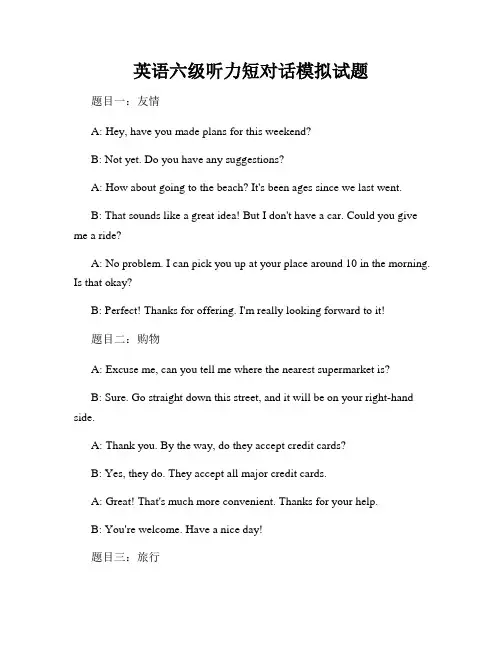
英语六级听力短对话模拟试题题目一:友情A: Hey, have you made plans for this weekend?B: Not yet. Do you have any suggestions?A: How about going to the beach? It's been ages since we last went.B: That sounds like a great idea! But I don't have a car. Could you give me a ride?A: No problem. I can pick you up at your place around 10 in the morning. Is that okay?B: Perfect! Thanks for offering. I'm really looking forward to it!题目二:购物A: Excuse me, can you tell me where the nearest supermarket is?B: Sure. Go straight down this street, and it will be on your right-hand side.A: Thank you. By the way, do they accept credit cards?B: Yes, they do. They accept all major credit cards.A: Great! That's much more convenient. Thanks for your help.B: You're welcome. Have a nice day!题目三:旅行A: Have you decided where to go for your summer vacation?B: I'm thinking about going to Bali. I've heard it's a popular tourist destination.A: That's a fantastic choice! The beaches there are beautiful, and there are lots of water activities to enjoy.B: Yes, I've seen some amazing pictures. I can't wait to go surfing and snorkeling.A: Make sure to bring your sunscreen. The sun can be really strong there.B: Thanks for the reminder. I'll pack everything I need for a perfect vacation.题目四:学习A: I can't seem to concentrate when I study at home. There are too many distractions.B: Have you tried studying in the library? It's usually quieter and more conducive to learning.A: That's a good idea. I'll give it a try. Is there a specific library you would recommend?B: The university library is a great option. It's spacious, has comfortable seating, and provides a quiet atmosphere.A: Thanks for the suggestion. I'll go there tomorrow and see if I can get more work done.B: You're welcome. Good luck with your studies!题目五:工作A: How's your new job going? I heard you started working last month.B: It's been challenging, but I'm enjoying it. Everyone in the office is really friendly and helpful.A: That's great to hear. What are your responsibilities in the company?B: I'm in charge of managing social media accounts and creating content for the company's website.A: That sounds like an interesting role. I'm glad you found a job that you enjoy.B: Thank you. I feel lucky to be in a position where I can apply my skills and learn new things.以上是英语六级听力短对话模拟试题,希望对你的学习有所帮助!。
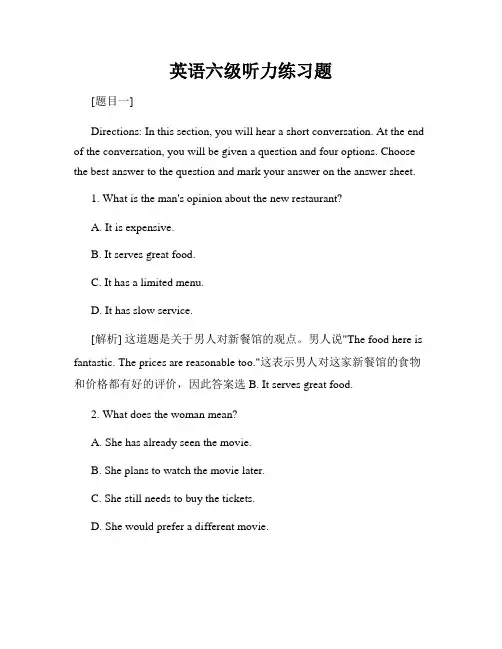
英语六级听力练习题[题目一]Directions: In this section, you will hear a short conversation. At the end of the conversation, you will be given a question and four options. Choose the best answer to the question and mark your answer on the answer sheet.1. What is the man's opinion about the new restaurant?A. It is expensive.B. It serves great food.C. It has a limited menu.D. It has slow service.[解析] 这道题是关于男人对新餐馆的观点。
男人说"The food here is fantastic. The prices are reasonable too."这表示男人对这家新餐馆的食物和价格都有好的评价,因此答案选B. It serves great food.2. What does the woman mean?A. She has already seen the movie.B. She plans to watch the movie later.C. She still needs to buy the tickets.D. She would prefer a different movie.[解析] 这道题是关于女人的意思。
女人说"I'm going to see the new movie this weekend."这表示周末她打算去看电影,因此答案选B. She plans to watch the movie later.[题目二]Directions: In this section, you will hear a short talk. After the talk, you will be given six questions. Choose the best answer to each question and mark your answer on the answer sheet.3. What is the talk mainly about?A. The history of jazz music.B. Different types of jazz instruments.C. Famous jazz musicians.D. The impact of jazz in America.[解析] 这道题是关于短篇讲话的主要内容。
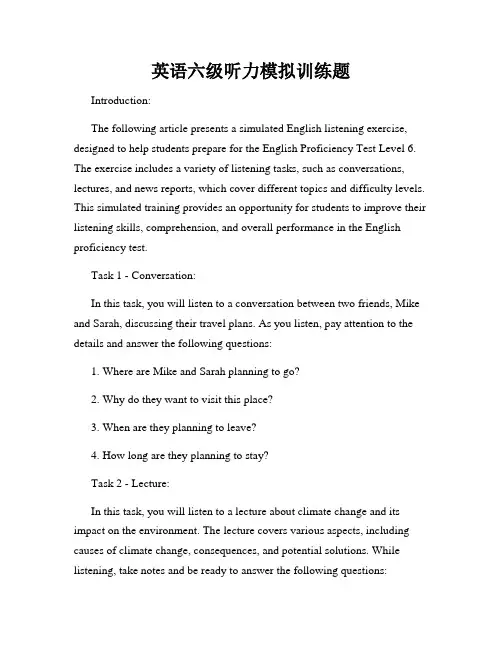
英语六级听力模拟训练题Introduction:The following article presents a simulated English listening exercise, designed to help students prepare for the English Proficiency Test Level 6. The exercise includes a variety of listening tasks, such as conversations, lectures, and news reports, which cover different topics and difficulty levels. This simulated training provides an opportunity for students to improve their listening skills, comprehension, and overall performance in the English proficiency test.Task 1 - Conversation:In this task, you will listen to a conversation between two friends, Mike and Sarah, discussing their travel plans. As you listen, pay attention to the details and answer the following questions:1. Where are Mike and Sarah planning to go?2. Why do they want to visit this place?3. When are they planning to leave?4. How long are they planning to stay?Task 2 - Lecture:In this task, you will listen to a lecture about climate change and its impact on the environment. The lecture covers various aspects, including causes of climate change, consequences, and potential solutions. While listening, take notes and be ready to answer the following questions:1. What are the main causes of climate change?2. Name three consequences of climate change.3. According to the lecturer, what can individuals do to help combat climate change?4. How can governments contribute to reducing greenhouse gas emissions?Task 3 - News Report:In this task, you will listen to a news report about the latest technological advancements in the field of artificial intelligence (AI). The report highlights the potential benefits and concerns associated with AI and its impact on various industries. Listen carefully and be prepared to answer the following questions:1. What are some potential benefits of artificial intelligence?2. According to the news report, which industries are likely to be significantly impacted by AI?3. What are some concerns raised about the use of AI?4. What measures are being taken to address these concerns and ensure the responsible use of AI technology?Conclusion:This simulated English listening exercise provides students with an opportunity to practice their listening skills and improve their performance in the English Proficiency Test Level 6. By engaging with a variety oflistening tasks, students can enhance their comprehension abilities and effectively understand different accents and topics. Remember to allocate enough time for each task, listen carefully, and take notes if necessary. Good luck with your preparation!。
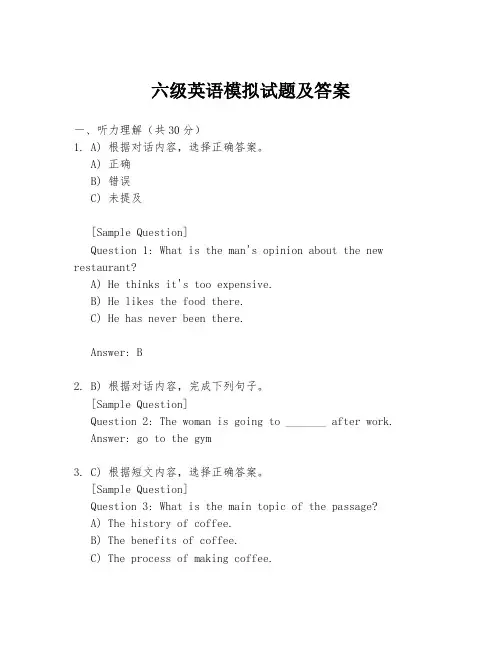
六级英语模拟试题及答案一、听力理解(共30分)1. A) 根据对话内容,选择正确答案。
A) 正确B) 错误C) 未提及[Sample Question]Question 1: What is the man's opinion about the new restaurant?A) He thinks it's too expensive.B) He likes the food there.C) He has never been there.Answer: B2. B) 根据对话内容,完成下列句子。
[Sample Question]Question 2: The woman is going to _______ after work. Answer: go to the gym3. C) 根据短文内容,选择正确答案。
[Sample Question]Question 3: What is the main topic of the passage?A) The history of coffee.B) The benefits of coffee.C) The process of making coffee.Answer: B二、阅读理解(共45分)1. A) 阅读下列短文,从每题所给的四个选项中,选择最佳选项。
[Sample Question]Passage 1According to the passage, what is the author's view on the importance of education?A) It is the key to success.B) It is a waste of time.C) It is not as important as experience.D) It is only important for certain professions.Answer: A2. B) 根据短文内容,回答问题。
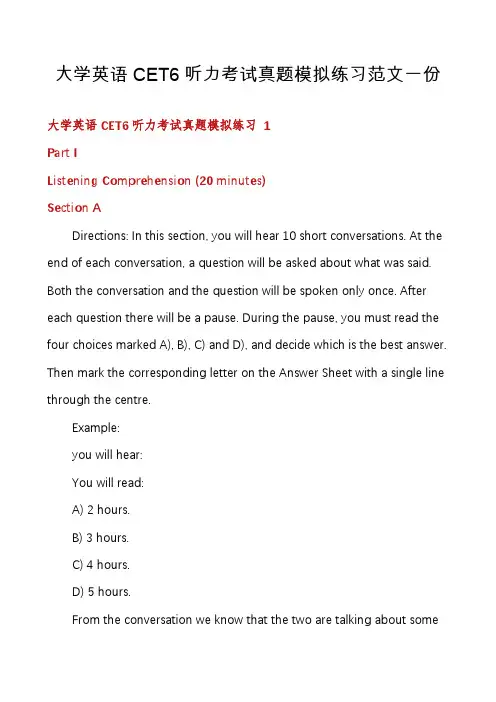
大学英语CET6听力考试真题模拟练习范文一份大学英语CET6听力考试真题模拟练习 1Part IListening Comprehension (20 minutes)Section ADirections: In this section, you will hear 10 short conversations. At the end of each conversation, a question will be asked about what was said. Both the conversation and the question will be spoken only once. After each question there will be a pause. During the pause, you must read the four choices marked A), B), C) and D), and decide which is the best answer. Then mark the corresponding letter on the Answer Sheet with a single line through the centre.Example:you will hear:You will read:A) 2 hours.B) 3 hours.C) 4 hours.D) 5 hours.From the conversation we know that the two are talking about somework they willstart at 9 o'clock in the morning and have to finish at 2 in the afternoon. Therefore, D) “5 hours" is the correct answer. You should choose [D] on the Answer Sheet and mark it with a single line through the centre.Sample Answer [A] [B] [C] [D]1.A) The man thinks travelling by air is quite safe.B) The woman never travels by plane.C) Both speakers feel nervous when flying.D) The speakers feel sad about the serious loss of life.2.A) At the information desk.B) In an office.C) In a restaurant.D) At a railway station.3.A)Write the letter.B) Paint the shelf.C) Fix the shelf.D) look for the pen.4.A) It gives a 30% discount to all customers.B) It is run by Mrs. Winter's husband?C) It hires Mrs. Winter as an adviser.D) It encourages husbands to shop on their own.5.A) Long exposure to the sun.B) Lack of sleep.?C) Too tight a hat.D) Long working hours.6.A) His English is still poor after ten years in America.B) He doesn't mind speaking English with an accent.C) He doesn't like the way Americans speak.D) He speaks English as if he were a native speaker.7.A) an auto mechanic.B) An electrician?C) A carpenter.D) A telephone repairman.8.A) They both enjoyed watching the gameB) The man thought the results were beyond their expectations.C) They both felt good about the results of the game.D) People were surprised at their winning the game.9.A) Manager and employee.B) Salesman and customer.C) Guide and tourist.D) Professor and student.10.A) Tom has arranged a surprise party for Lucy.B) Tom will keep the surprise party a secret.C) Tom and Lucy have no secrets from each other.D) Tom didn' t make any promise to Lucy.。
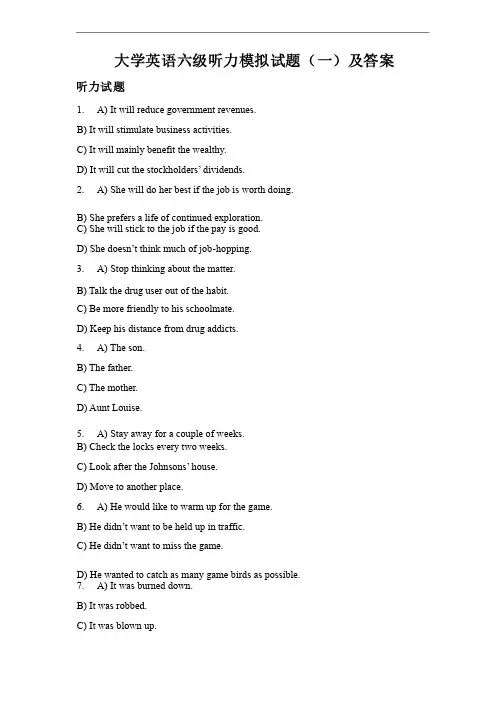
大学英语六级听力模拟试题(一)及答案听力试题1. A) It will reduce government revenues.B) It will stimulate business activities.C) It will mainly benefit the wealthy.D) It will cut the stockholders’ dividends.2. A) She will do her best if the job is worth doing.B) She prefers a life of continued exploration. C) She will stick to the job if the pay is good.D) She doesn’t think much of job D) She doesn’t think much of job-hopping. -hopping.3. A) Stop thinking about the matter.B) Talk the drug user out of the habit.C) Be more friendly to his schoolmate.D) Keep his distance from drug addicts.4. A) The son.B) The father.C) The mother.D) Aunt Louise.5. A) Stay away for a couple of weeks.B) Check the locks every two weeks.C) Look after the Johnsons’ house.D) Move to another place.6. A) He would like to warm up for the game.B) He didn’t want to be held up in traffic.C) He didn’t want to miss the game.D) He wanted to catch as many game birds as possible. 7. A) It was burned down.B) It was robbed.C) It was blown up.D) It was closed down.8. A) She isn’t going to change her major.B) She plans to major in tax law.C) She studies in the same school as her brother.D) She isn’t going to work in her brother’s firm.9. A) The man should phone the hotel for directions.B) The man can ask the department store for help.C) She doesn’t have the hotel’s phone number. D) The hotel is just around the corner.10. A) She doesn’t expect to finish all her work in thirty minutes.B) She has to do a lot of things within a short time.C) She has been overworking for a long time.D) She doesn’t know why there are so many things to do.Section B Compound Dictation注意:注意:听力理解的B 节(Section B)为复合式听写(Compound Dictation),题目在试卷二上,现在请取出试卷二。
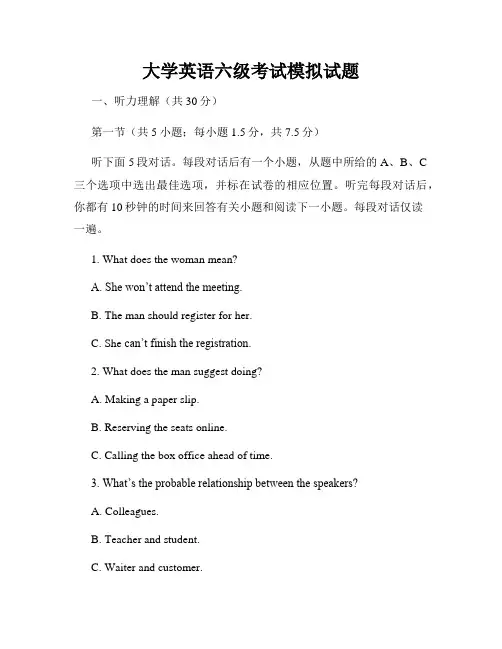
大学英语六级考试模拟试题一、听力理解(共30分)第一节(共5小题;每小题1.5分,共7.5分)听下面5段对话。
每段对话后有一个小题,从题中所给的A、B、C 三个选项中选出最佳选项,并标在试卷的相应位置。
听完每段对话后,你都有10秒钟的时间来回答有关小题和阅读下一小题。
每段对话仅读一遍。
1. What does the woman mean?A. She won’t attend the meeting.B. The man should register for her.C. She can’t finish the registration.2. What does the man suggest doing?A. Making a paper slip.B. Reserving the seats online.C. Calling the box office ahead of time.3. What’s the probable relationship between the speakers?A. Colleagues.B. Teacher and student.C. Waiter and customer.4. What are the speakers talking about?A. Vacation plans.B. Weather conditions.C. Travel arrangements.5. What are the speakers mainly discussing?A. A party plan.B. A music composition.C. An interview invitation.第二节(共5小题;每小题1.5分,共7.5分)听下面5段对话或独白。
每段对话或独白后有几个小题,从题中所给的A、B、C三个选项中选出最佳选项,并标在试卷的相应位置。
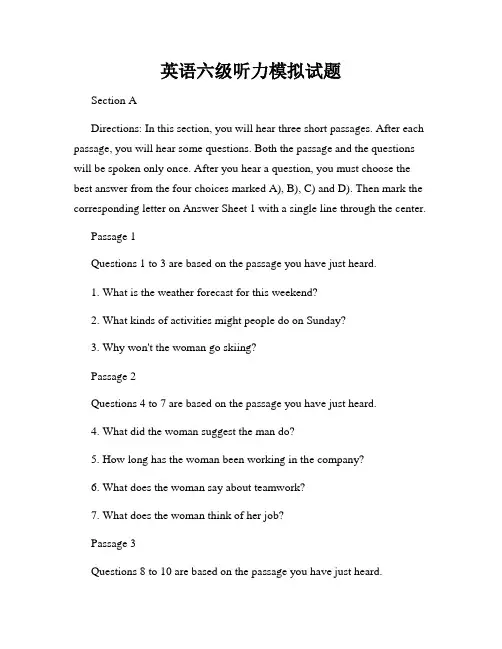
英语六级听力模拟试题Section ADirections: In this section, you will hear three short passages. After each passage, you will hear some questions. Both the passage and the questions will be spoken only once. After you hear a question, you must choose the best answer from the four choices marked A), B), C) and D). Then mark the corresponding letter on Answer Sheet 1 with a single line through the center.Passage 1Questions 1 to 3 are based on the passage you have just heard.1. What is the weather forecast for this weekend?2. What kinds of activities might people do on Sunday?3. Why won't the woman go skiing?Passage 2Questions 4 to 7 are based on the passage you have just heard.4. What did the woman suggest the man do?5. How long has the woman been working in the company?6. What does the woman say about teamwork?7. What does the woman think of her job?Passage 3Questions 8 to 10 are based on the passage you have just heard.8. When does the library close on weekdays?9.What services are offered by the library?10.What should people bring in order to use the copying service?Section BDirections: In this section, you will hear two long conversations. At the end of each conversation, you will hear some questions. Both the conversation and the questions will be spoken only once. After you hear a question, you must choose the best answer from the four choices marked A), B), C) and D). Then mark the corresponding letter on Answer Sheet 1 with a single line through the center.Conversation 1Questions 11 to 13 are based on the conversation you have just heard.11. What is the man's problem?12. Why does the man want to change his career?13. What advice does the woman give to the man?Conversation 2Questions 14 to 16 are based on the conversation you have just heard.14. What is the man's complaint?15. When does the situation usually occur?16. What does the woman suggest the man do?Section CDirections: In this section, you will hear three passages. At the end of each passage, you will hear some questions. Both the passage and the questions will be spoken only once. After you hear a question, you must choose the best answer from the four choices marked A), B), C) and D). Then mark the corresponding letter on Answer Sheet 1 with a single line through the center.Passage 1Questions 17 to 20 are based on the passage you have just heard.17. Who is Dr. Smith?18. What was the purpose of the study?19. How long did the study last?20. What was the main finding of the study?Passage 2Questions 21 to 23 are based on the passage you have just heard.21. What did researchers find about happy people?22. What conclusion can be drawn about unhappy people?23. What does the speaker suggest people do to improve their well-being?Passage 3Questions 24 to 26 are based on the passage you have just heard.24. What does the speaker say about photo apps?25. What are the effects of using photo-editing apps according to the speaker?26. What is the speaker's opinion about using photo-editing apps?That concludes the listening section. Please turn to Part B for the reading comprehension section of the exam. Thank you.。
英语六级模拟试题真题Part I: Listening Comprehension (30 minutes)Section ADirections: In this section, you will hear three news reports. At the end of each news report, you will hear two or three questions. Both the news report and the questions will be spoken only once. After you hear a question, you must choose the best answer from the four choices marked A), B), C), and D). Then mark the corresponding letter on Answer Sheet 1 with a single line through the centre.Questions 1 and 2 are based on the news report you have just heard.1. A) It will take one month for the WHO to identify the new coronavirus.B) The outbreak of the new coronavirus pandemic has been largely contained.C) The new coronavirus may pose a serious threat to public health worldwide.D) Measures have been taken to develop a vaccine against the new coronavirus.2. A) Have their passports checked by immigration officers.B) Present their medical certificates at boarding gates.C) Go through a health screening before departure.D) Have their body temperatures taken by airport staff.Questions 3 and 4 are based on the news report you have just heard.3. A) New York ranks the highest in the number of ultra-wealthy individuals.B) The number of ultrawealthy individuals living in Tokyo is decreasing.C) Hong Kong and London are losing their appeal to ultra-wealthy individuals.D) San Francisco is the city to gain the most new ultra-wealthy residents.4. A) They regard it as a relatively reliable investment.B) They are more cautious about investing in stocks.C) They consider luxury goods a profitable business.D) They find real estate less attractive than other investments.Questions 5 to 7 are based on the news report you have just heard.5. A) It abandoned its tradition of using fully recyclable materials.B) It introduced a new design without considering recyclability.C) It applied a new technique to make its products more durable.D) It developed a new packaging material for its products.6. A) Promote a brand-new product line.B) Showcase cutting-edge technology.C) Advocate their commitment to sustainability.D) Demonstrate their innovative manufacturing process.7. A) Requiring customers to pay for the recycling cost.B) Encouraging customers to reuse the products.C) Promoting customers to recycle the products.D) Providing incentives for customers to reduce waste.Section BDirections: In this section, you will hear two long conversations. At the end of each conversation, you will hear four questions. Both the conversation and the questions will be spoken only once. After you hear a question, you must choose the best answer from the four choices marked A), B), C), and D). Then mark the corresponding letter on Answer Sheet 1 with a single line through the centre.Questions 8 to 11 are based on the conversation you have just heard.8. A) Register online before making a purchase.B) Pay for the software upgrade in installments.C) Seek help from experienced individuals.D) Get a free trial before buying the software.9. A) He is not sure if his friend will attend the presentation.B) He doesn't expect his friend to be interested in the software.C) He thinks his friend may have already upgraded the software.D) He wants his friend to provide feedback on the software.10. A) She attended a similar presentation in the past.B) She is not familiar with the software features.C) She doesn't believe software upgrades are necessary.D) She hasn't heard of the software before.11. A) Introduce new software to potential customers.B) Explain the benefits of using upgraded software.C) Help users understand the difficulties of upgrading.D) Offer tips for using the new software effectively.Questions 12 to 15 are based on the conversation you have just heard.12. A) In a library.B) On a bus.C) At a party.D) In a classroom.13. A) He always arrives late for his appointments.B) He is not used to studying in the evening.C) He doesn't want to be disturbed by classmates.D) He doesn't want to waste time commuting to school.14. A) The books are not up-to-date.B) He can keep them for a longer period.C) They are always available when he needs them.D) He can borrow as many books as he wants.15. A) They consider a library as an important facility on campus.B) They believe libraries are open longer during exam periods.C) They prefer using e-books to print books for convenience.D) They think self-study is more effective in the library.Part II: Reading Comprehension (Skimming and Scanning) (15 minutes)Directions: In this part, you will have 15 minutes to go over the passage quickly and answer the questions on Answer Sheet 1. For questions 16 to 20, mark16. What do we learn about phone addiction from studies?17. What is found to be prevalent in people with a high smartphone dependency?18. According to a survey, how many people in the U.S. suffer from smartphone addiction?19. What do smartphone addiction and drug addiction have in common?20. What does Professor Yen say about smartphone addiction among young people?Part III: Reading Comprehension (Detail) (20 minutes)Directions: In this part, there are four passages. Each passage is followed by several questions or unfinished statements. For each of them, there are four choices marked A), B), C), and D). You should decide on the best choice and mark the corresponding letter on Answer Sheet 1 with a single line through the centre.21. The passage focuses on ___________.22. The author describes the Humboldt penguin as ___________.23. According to Dr. Arvind Sharma, to protect the penguins we should ___________.24. What does the author say about the Peruvian penguin colonies?25. Which of the following statements is true according to the passage?Passage Two26. What is the author's attitude toward automation in industries?27. What does the passage say about North America's automobile factories?28. Which industry is mentioned as having "limited potential" for automation?29. What does the author say about job availability in the future?30. What does the passage say about retraining workers?Passage Three31. What is the purpose of cursive writing mentioned in the passage?32. How does cursive writing benefit children?33. What does the passage say about cursive writing skills in the United States?34. According to some experts, cursive writing is valuable because___________.35. The author argues that cursive writing should be ___________.Passage Four36. When did Arthur Guinness begin brewing beer in Dublin?37. What does the passage say about the water used in Guinness beer?38. How long does it take to brew a pint of Guinness?39. What sets the Guinness beer apart from other brews?40. What can we learn from the passage about Guinness's success?Part V: Cloze (10 minutes)Directions: There are 20 blanks in the following passage. For each blank, there are four choices marked A), B), C), and D) on Answer Sheet 1. You should choose the best answer and mark the corresponding letter on Answer Sheet 1 with a single line through the centre.41. A) down B) up C) from D) over42. A) disappeared B) vanished C) dwindled D) faded43. A) assessing B) evaluating C) providing D) considering44. A) monitoring B) preventing C) managing D) regulating45. A) access B) capability C) opportunity D) seclusion46. A) provide B) require C) allow D) enable47. A) avoid B) discourage C) prevent D) defend48. A) provide B) promote C) maintain D) establish49. A) unanticipated B) unpredictable C) irregular D) uncertain50. A) qualified B) professional C) competent D) expert...(Continued with the remaining blanks)。
大学英语六级(听力)模拟试卷40(题后含答案及解析)题型有:1. What does the speaker recommend strongly in the end?4.A.How to effectively communicate with other people.B.The necessity of completing any task effectively.C.Why some of us have better memories than others.D.The importance of memory and ways to improve it.正确答案:D解析:短文开头就说,记忆力几乎和空气、水、阳光一样重要。
可知主题和memory有关。
最后又提到,有很多种方法可以提高记忆力。
所以D正确。
知识模块:短文听力5.A.Remember everything that they have seen even once.B.Express their ideas or feelings by drawing pictures.C.Point out the places where they’ve been to in maps.D.Recall the knowledge they have acquired quickly.正确答案:A解析:短文提到“据说有照相记忆功能的人”之后说他们能够“记住任何他们只见过一次的东西”,A与后半句同义,所以正确。
知识模块:短文听力6.A.Associate what we see with words.B.Find special ways to remember things.C.Go picnic to release our tension.D.Use our memory as much as we can.正确答案:D解析:短文说,保持好记忆力的秘诀就是尽量多记。
大学英语六级(听力)模拟试卷15(题后含答案及解析) 题型有: 3. Listening ComprehensionPart III Listening Comprehension (35 minutes)Section CDirections: In this section, you will hear a passage three times. When the passage is read for the first time, you should listen carefully for its general idea. When the passage is read for the second time, you are required to fill in the blanks numbered from 36 to 43 with the exact words you have just heard. For blanks numbered from 44 to 46 you are required to fill in the missing information. For these blanks, you can either use the exact words you have just heard or write down the Everyone would have heard the famous phrase “Anger is one sort of danger”. It is an age-old saying, but it is tested and still holds true. Things said or done during anger have created 【B1】______with a lot of people and things. The 【B2】______packed bag of mental frustration 【B3】______into a volcano of anger. But basically let’s try to analyze why you get angry. When one is not satisfied with the way things have gone, when one blames life for treating him bad, and many such 【B4】______things are the various reasons. All the 【B5】______ get collected on one part of our mind and when we can bear it no longer, our feelings are vented in the form of a volcano of emotional 【B6】______.Anger is one of the major 【B7】______in self-development, because it narrows our outlook. The mind looses its sense of logic and fairness, when it is 【B8】______by the arrogant mood of anger. Getting angry can get your things done somewhere, but not everywhere. 【B9】______. No one has the foresight or capacity to judge what has bought you to that violent mood or what hardships you have faced. Angry people hardly make achievements. 【B10】______. The best way to counterattack anger is to hold patience by ourselves. 【B11】______. He controlled himself every time and got away from trying circumstances using the best lifeline available. Such people are always in peace with themselves and are always enjoying life.1.【B1】正确答案:devastation 涉及知识点:复合式听写2.【B2】正确答案:tightly 涉及知识点:复合式听写3.【B3】正确答案:erupts 涉及知识点:复合式听写4.【B4】正确答案:trivial 涉及知识点:复合式听写5.【B5】正确答案:frustrations 涉及知识点:复合式听写6.【B6】正确答案:rages 涉及知识点:复合式听写7.【B7】正确答案:obstacles 涉及知识点:复合式听写8.【B8】正确答案:accelerated 涉及知识点:复合式听写9.【B9】正确答案:This is because as you grow, you yourself are responsible to clean your recycle bin of emotions and frustrations 涉及知识点:复合式听写10.【B10】正确答案:The closer one comes to this piece of reality, the better he will get 涉及知识点:复合式听写11.【B11】正确答案:A person with infinite patience is mature mentally, and is the bravest war-horse over the path of anger 涉及知识点:复合式听写The Taj Mahal is to open on moonlit evenings 20 years after security fears ended night visits. India’s Supreme Court will allow the famous 【B1】______to love to open four nights a month, 【B2】______for three months. The Taj, built in the 1600s by the Mughal 【B3】______Shah Jahan as a tomb for his wife, is a world 【B4】______site. Only 400 visitors will be let in each night, and parking restrictions will be 【B5】______around the site. The Supreme Court 【B6】______came as state officials in Uttar Pradesh were celebrating the Taj’s 350th 【B7】______close toits site in the city of Agra. “This reopening of the Taj for moonlight viewing is going to draw 【B8】______ crowds from across the globe, “ State tourism minister Kaukab Hamid said. “【B9】______.”Tourist chiefs said more than 300,000 foreigners visited the Taj Mahal site in 2003, but numbers are down since the terror attacks in the U. S. on 11 September 2003. 【B10】______. The Sikh insurgency (叛乱) ended in the mid-1990s, but Indian authorities have remained reluctant to let visitors back to the Taj after sunset. Shah Jahan built the Taj Mahal as an expression of love for his wife Mumtaz Mahal. 【B11】______.12.【B1】正确答案:monument 涉及知识点:复合式听写13.【B2】正确答案:initially 涉及知识点:复合式听写14.【B3】正确答案:emperor 涉及知识点:复合式听写15.【B4】正确答案:heritage 涉及知识点:复合式听写16.【B5】正确答案:imposed 涉及知识点:复合式听写17.【B6】正确答案:announcement 涉及知识点:复合式听写18.【B7】正确答案:anniversary 涉及知识点:复合式听写19.【B8】正确答案:fantastic 涉及知识点:复合式听写20.【B9】正确答案:We will ensure strict security and follow visitor guidelines laid down by the court 涉及知识点:复合式听写21.【B10】正确答案:Night visits to it, once a romantic highlight of any visit to India, were banned in 1984 for some reason 涉及知识点:复合式听写22.【B11】正确答案:It is largely made of white stone that reflects the changes of color visible during sunset and nights with clear moon 涉及知识点:复合式听写Helen Keller, a world-famous author and public speaker suffered from a strange 【B1】______when she was only 19 months old. It made her 【B2】______blind and deaf. For the next five years she had no way of successfully 【B3】______with other people. Before her seventh birthday, the family hired a 【B4】______tutor Anne Sullivan. Anne was careful to teach Helen 【B5】______those subjects in which she was interested. As a result Helen became gentler and she soon learnt to read and write in Braille (盲文). She also learnt to read people’s lips by pressing her finger-tips against them and feeling the movement and 【B6】______. She also learnt to speak, a major 【B7】______for someone who could not hear at all. Helen 【B8】______to be a remarkable scholar, graduating with honors from Radcliffe College in 1904. 【B9】______. While she was still at college she wrote “The Story of My Life”. This was an immediate success and earned her enough money to buy her own house. She toured the country, giving lectures. Many books were written about her and several films were made about her life. Eventually,【B10】______. After her death in 1968, an organization, Helen Keller International, was set up in her name to combat blindness in the developing world. 【B11】______.23.【B1】正确答案:sickness 涉及知识点:复合式听写24.【B2】正确答案:completely 涉及知识点:复合式听写25.【B3】正确答案:communicating 涉及知识点:复合式听写26.【B4】正确答案:private 涉及知识点:复合式听写27.【B5】正确答案:especially 涉及知识点:复合式听写28.【B6】正确答案:vibrations 涉及知识点:复合式听写29.【B7】正确答案:achievement 涉及知识点:复合式听写30.【B8】正确答案:proved 涉及知识点:复合式听写31.【B9】正确答案:She had phenomenal powers of concentration and memory, as well as a strong determination to succeed 涉及知识点:复合式听写32.【B10】正确答案:she became so famous that she was invited abroad and received many honors from foreign universities 涉及知识点:复合式听写33.【B11】正确答案:Today that agency is one of the biggest organizations working with blind people overseas 涉及知识点:复合式听写。
大学英语六级听力部分模拟试题大学英语六级听力部分模拟试题Part I Listening Comprehension (20 minutes)Section A听力原文1. M: I guess we’ll have a hot summer again.W: I know. Last summer was mild. Do you remember our first summer here? The temperature stayed about 100 degrees Fahrenheit for ten straight days. There wasn’t a breeze anywhere.Q: What do you know about their first summer?A) Mild.B) Draughty.C) Hot.D) Cool.2. W: If I understand you correctly, Mr. Johnson, well within the speed limit when you were stopped by the Police.M: That’s right, I always keep to the limit in Downside Road because there is a school slope on the corner of the first turning and I wouldn’t want to run the risk of hitting one of the kids, would I[dq]?Q: What do we learn from the conversation?A) The man was stopped by the police because he was driving too fast.B) The man habitually drove fast but he slowed down where there was a school slope.C) The man hit one of the kids on the corner of the first turning.D) The woman inquiring the man is probably a judge.3. M: I’m almost worn out, I’ve been totally busy at the office and now I’ve got a stiff neck. Guess I’m getting old.W: Don’t be silly. You just need[sipt a rest.Q: How does he feel?A) Young.B) Lonely.C) Sad.D) Tired.4. W: My English teacher suggested that I come in and borrow a Longman Dictionary of Contemporary English.M: Of course, Miss, you’re welcome, but they may not the library. Wouldn’t it be better if you h ad one of your own?[ Q: What did the man suggest that the woman do?A) Take the dictionary out the library.B) Buy a new dictionary for herself.C) Borrow the dictionary for herself.D) She is welcome to the library.5. M: The hijacking incident ended with the death of the three kidnappers.W: How were the passengers?M: Well, all the passengers and crew members landed on their feet finally.Q: What happened to the passengers?A) None of them survived.B) Some were wounded, but there were no deaths.C) Some were kidnapped.D) All of them landed safely.6. W: I am a stranger here. Where can I have copies made of my application?M: Isn’t there a photocopy machine in the post office thatyou were just in?Q: What does the man Imply?A) He doesn’t know if there is a photocopy machine there.B) He asks the woman to mail a copy of the application.C) The photocopy machine isn’t in the office any more.D) The woman can make copies at the post office.7. W: I’m going to invite a few of my classmates to a party.M: You can’t invite just a few. The others will be angry.Q: What does the man imply that the woman should do?A) Invite everyone.B) Have two parties.C) Take a few classes.D) Not get angry.8. M: We’ll have to hurry if we’re going to be on time to get to t he airport. It’s already eight thirty.W: Well, it takes only half an hour to get to the airport, and the plane doesn’t leave until nine fifteen. I think we’ll make it all right if we leave immediately.Q: How much time is the couple allowed once they get to the airport?A) Three quarters of an hour.B) Ten minutes.C) Half an hour.D) A quarter of an hour.9. W: Mr. Williams, how can I help you?M: It never used to trouble me, but now after only a couple of glasses, I start to feel really terrible. Could you give me some advice?Q: What’s the trouble with the man?A) He’s got a stomachache.B) He’s got a headache.C) He has eye trouble.D) He is alcoholic.10. W: What’s the matter? You are over forty five minutes late.M: I’m sorry. I had an unexpected visi tor.W: Well, at least you could have called.Q: What is the man’s feeling?A)Hysterical.B)RelaxedC) Upset.D) Suspicious.Section BPassage OneAlbert Schweitzer was bornin 1874 in Alsace. At that time it was a part of Germany. His generous spirit was first awakened through his training as a Lutheran minister. Besides gaining a reputation as a preacher, he also becamerespected for his ability to play the organ. He was a man of many talents. His concern for other people turned his attention to medicine. He had also acquired doctoral degrees in philosophy and music. His wife took an interest in medicine also and became a nurse. Many people thought that he should remain and lecture in Europe to have a strong impact on Western civilization. Though he listened to their suggestions, he ultimately decided to follow his own conscience. This led him to Africa. Albert had felt that all men should accept the responsibility of helping others. He felt particularly concerned for black Africans who had been exploited by the white men. He earned the money he needed by performing on the organ and by lecturing. With this money he boughtequipment and opened a hospital in Africa. He was a man of great strength who faced great problems with courage. The threat of war, the reality of imprisonment during World War I as a German citizen, and the unbearable heat in Africa did not hinder him at all. He believed that man could overcome these obstacles if he had a sense of idealism. He died in 1965.Questions 11 to 13 are based on the passage you have just heard.11. Which of the following is true about Albert Schweitzer?A) He is a segreationist.B) He isan African.C) He is a humanism.D) He is a violinist12. What were his talents?A) Lecturing, giving concerts, and giving medical care.B) Fighting as a brave soldier, giving concerts and treating illness.C) Giving free medicine and writing stories.D) Teaching his wife, treating patients and giving concerts.13. Which obstacle did he not have to face?A) Hot climate.B) Serious illness.C) Threat of war.D) Imprisonment.Passage TwoA young man once wentto town and bought himself a pair of trousers. When he got home he went upstairs to his bedroom and put them on. He found that they were two inches too long.He went downstairs, where his mother and two sisters were busy washing up the tea things in the kitchen. “These newtrousers are too long.” He said, “They need shortening by about two inches. Would one of you mind doing this for me, please?” His mother and sisters were busy and n one of them said anything.But as soon as his mother had finished washing up, she went quietly upstairs to her son’s bedroom and shortened the trousers by two inches. She came downstairs without saying anything to her daughters.The elder sister was a kind-hearted girl. She went quietly upstairs after supper without saying anything to anyone, and cut the trousers by two inches.The young sister went to the cinema, but when she came back, she remembered what her brother had said. So she ran upstairs with her scissors, needle and thread and took two inches off the legs of the new trousers.You can imagine the look on the young man’s face when he put the trousers on the next morning.Questions 14 to 17 are based on the passage you have just heard.14. Which of the following is true?A) The son asked his mother and two sisters each cut the trousers by 2 inches.B) The mother and the sisters need shortening the trousers by 2 inches.C) The mother shortened the trousers in her own bedroom downstairs.D) The sist ers cut the trousers in their brother’s bedroom upstairs respectively.15. How many inches too short were the trousers when the young man finally put them on?A) 2 inches.B) 6 inches.C) 4 inches.D) 8 inches.16. What does the passage tell us?A) People sometimes do something wrong with good intention.B) One should discuss it with others if he wants to do something.C) The mother should have helped her son as soon as she was asked to .D) The son should have bought the pair of trousers of his own size.17. What look can you imagine was on the young man’s face.A)Interesting.B)Puzzling.C) Angry.D) Merry.。
大学英语六级(听力)模拟试卷3(题后含答案及解析)题型有:1. What is the man’s attitude towards James’future?9.A.He wants to be a competent graduate.B.He wants to become a college teacher.C.He wants to study in Oxford University.D.He wants to change his life by studying.正确答案:C解析:选项均以He wants to开头表明,本题考查He的计划或打算。
男士说Malcolm总是很勤奋,最近几个月每天晚上都与书本为伴,他想明年去牛津大学读书,由此可知,答案为[C]。
知识模块:听力10.A.He is too young to catch up with others.B.He is not intelligent enough.C.He pays too little attention to his study.D.He can not finish his homework independently.正确答案:C解析:选项中的He,too young to catch up,not intelligent,pays…little attention 等表明,本题可能与He成绩不理想的原因有关。
男士说老师认为James有能力,但总是不能坚持,换句话说就是,他如果努力学习,成绩不会这么糟,但他就是很懒惰。
而对于考试,James也很无所谓,每天用十分钟写完作业后就跑去打网球了,由此可知,James在学习上投入的精力太少,故答案为[C]。
知识模块:听力11.A.He wants James to be a good lawyer.B.He won’t force James to study what he isn’t good at.C.He wants James to follow his footsteps.D.He will make efforts to stop James playing tennis.正确答案:B解析:选项中的He wants,James,follow his footsteps,stop...playing tennis 等表明,本题可能考查男士对James的将来的打算。
2023级大学英语六级(新题型)听力模拟考试Part II Listening Comprehension (30 minutes)Section ADirections: In this section, you will hear 8 short conversations and 2 long conversations. At the end of each conversation, one or more questions will be asked about what was said.Both the conversation and the questions will be spoken only once. After each questionthere will be a pause. During the pause, you must read the four choices marked A). B).C) and D), and decide which is the best answer. Then mark the corresponding letteron Answer Sheet 1 with a single line through the centre.11. A. He is angry.B. He is in love.C. He is scared.D. He is talkative.12.A. Take more rest breaks while at work.B. Quit her job and find a new one.C. Ask for a leave from her boss.D. Talk to her boss directly.13.A. Things on sale may be worth buying.B. Things on sale are not worth buying.C. Things on sale are out of style and season.D. Things on sale are carefully looked over..14.A. The apartment is better furnished.B. She prefers to live in a quiet place.C. It’s less expensive for her to live in an apartment.D. She finds her roommates difficult to get along with.15.A. She didn’t know her daughter could sing so well.B. She thinks that she sings better than her daughter.C. She doesn’t like her daughter at all.D. She herself doesn’t have a good voice.16.A. Change the T-shirts for smaller ones.B. Sell T-shirts for her son.C. Work as an assistant at the store.D. Wake these T-shirts smaller.17.A. There are other men available apart from David for the woman.B. There are other meaningful things except dating with David.C. There are opportunities to develop her relationship with David.D. There are many friends to support her and her relationship.18.A. He heard someone break the glass.B. He didn’t know the juice was in the kitchen.C. He met a car accident this morning.D. He carelessly broke the container of the juice.DConversation One.Questions 19 to 21 are based on the conversation you have just heard. 19.A. She attended one of their meetings.B. Her roommate is a member.C. She read about them in the newspaper.D. She saw them protesting.20.A. Secure more student parking spaces.B. Preserve open spaces on campus.C. Get more funding for their group.D. Schedule a meeting with college administrators.21. A. Help the man plan a student rally.B. Use the student parking lot.C. Make a donation to support the group.D. Sign a petition.Conversation Two.Questions 22 to 25 are based on the conversation you have just heard.22. A. A vacation and art collection.B. A trip and a new car.C. Cash and a car.D. Money and a trip.23. A. It can break through the ice easily.B. It can shut and open both eyes quickly.C. It can communicate other sharks by winks.D. It can roll up and down its eyes slowly.24. A. An elephant.B. A huge squid.C. A whale.D. A tuna.25. A. 134.B. 148.C. 158.D. 185.Section BDirections:In this section, you will hear 3 short passages. At the end of each passage, you will hear some questions. Both the passage and the questions will be spoken only once.After you hear a question, you must choose the best answer from the four choicesmarked A), B), C), and D). Then mark the corresponding letter on Answer Sheet 1 witha single line through the centre.注意:此部分试题请在答题卡1上作答Passage One.Questions 26 to 29 are based on the conversation you have just heard.26. A. Classmates.B. Colleagues.C. Boss and secretary.D. PR representative and client.27. A. He felt his assignment ws tougher than Sue’s.B. His clients complained about his service.C. He thought the boss was unfair to him.D. His boss was always finding fault with his work.28. A. She is unwilling to undertake them.B. She complains about her bad luck.C. She always accepts them cheerfully.D. She takes them on, though reluctantly.29. A. Sue got promoted.B. John had to quit his job.C. Both John and Sue got a raise.D. Sue failed to complete her project.Passage Two.Questions 30 to 32 are based on the conversation you have just heard.30. A. By greeting each other very politely.B. By exchanging their views on public affairs.C. By displaying their feelings and emotions.D. By asking each other some personal questions.31. A. Refrain from showing his feelings.B. Express his opinion frankly.C. Argue fiercely.D. Yell loudly.32. A. Getting rich quickly.B. Distinguishing oneself.C. Respecting individual rights.D. Doing credit to one’s community.Passage Three.Questions 33 to 35 are based on the conversation you have just heard.33. A. If they don’t involve any risks.B. If they produce predictable side effects.C. When the urgent need for them arises.D. When tests show that they are relatively safe.34. A. Because they are not accustomed to it.B. Because they are not psychologically prepared for it.C. Because their genes differ from those who have been tested for it.D. Because they are less sensitive to it than those who have been tested for it.35. A. They will have to take ever larger doses.B. They will become physically impaired.C. They will suffer from minor discomfort.D. They will experience a very painful process.Section C:Directions: In this section, you will hear a passage three times. When the passage is read for the first time, you should listen carefully for its general idea. When the passage is read for the second time, you are required to fill in the blanks with the exact words you have just heard. Finally, when the passage is read for the third time, you should check what you have written.注意:此部分试题请在答题卡1上作答Certain phrases one commonly hears among Americans capture their devotion to individualism: “Do your own thing.”“I did it my way.”“You’ll have to decide that for yourself.”“You made your bed, now (36) _________ in it.”“If you don’t look out for yourself, no one else will.”“Look out for number one.”Closely (37) ________ with the value they place on individualism is the importance Americans (38)___________ to privacy. Americans assume that people “need some time to themselves”or “some time alone”to think about things or recover their (39) __________ psychological energy. Americans have great (40)____________ understanding foreigners who always want to be with another person, who (41) ___________ being alone.If the parents can (42) ___________ it, each child will have his or her own bedroom. Having one’s own bedroom, even as an (43) ___________, fixes in a person the notion that she (44) ___________________ a place of her own where she can be by herself, and keep her possessions. She will have her clothes, her toys, her books, and so on. These things will be hers and no one else’s.Americans assume that people will have their (45) ____________________ that might never be shared with anyone. Doctors, lawyers, psychiatrists, and others have rules governing “confidentiality” that are intended to prevent information about their clients’ personal situations from becoming known to others.Americans’attitudes about privacy can be hard for foreigners to understand. Americans’houses, yards and even their offices can seem (46) __________________. Yet in the minds of Americans, there are boundaries that other people are simply not supposed to cross. When those boundaries are crossed, an American’s body will visibly stiffen and his manner will become cool and aloof.。
英语六级听力真题模拟练习
WASHINGTON— This week brings increasedpressure on U.S. lawmakers to reform orreauthorize the National Security Agency’sability to gather domestic telephone records
foranti-terrorist purposes, because the programexpires at the end of this month.
A federal appeals court ruled so-called “bulk metadata” collection illegal but did notorder a stop to the program launched in the aftermath of the September 11, 2001,terrorist attacks on the United States.
Even before last week’s court decision, some in Congres s were urging reform of domesticspying.
“I believe we have to protect our national security, but we also have to protect our civilliberties that make us unique as a country,” Democratic Senator Patrick Leahy said.
NSA leaks
Exposed by fugitive former NSA contractor Edward Snowden, the program caused a firestormwhen Americans learned of vast telecommunications monitoring by a shadowy U.S. agency.
Last year, President Barack Obama pledged what he called “a new approach.”
“The United States is not sp ying on ordinary people who do not threaten our nationalsecurity, and we take their privacy concerns into account in our policies and procedures,"Obama said then.
Moments after the court ruling last week, several Republicans rushed to defend the program,which reportedly collects and stores phone records but not the content of
calls made.
“The NSA can find connections from known terrorists overseas and connect them to potentialterrorists here in the United States. Critics of the program either want to do away with it ormake it much more difficult to use," Senate
Majority Leader Mitch McConnell said.
Ending the program is unthinkable, Senate Intelligence Committee Chairman Richard Burr said. “We are going to keep America safe. We are not going to revert back to where we aresusceptible to another 9-11," he said.
Others see a threat to privacy.
“I say the phone records of law-abiding citizens are none of their damn business," RepublicanSenator Rand Paul.
Commitment to transparency
That the debate is unfolding at all shows America’s commitment to transparency, PresidentObama said.
“No one expects China to have an open debate about their surveillance programs, or Russia totake the privacy concerns of citizens into account. But let us remember: we are held to adifferent standard precisely because we have been at the forefront of defending personalprivacy and human dignity," he said.
Many expect the Supreme Court will ultimately decide the constitutionality of bulk datacollection.
In the meantime, Congress could extend the NSA program or reform it. Lawmakers of bothparties say the stakes for national security, and civil liberties, are high.。